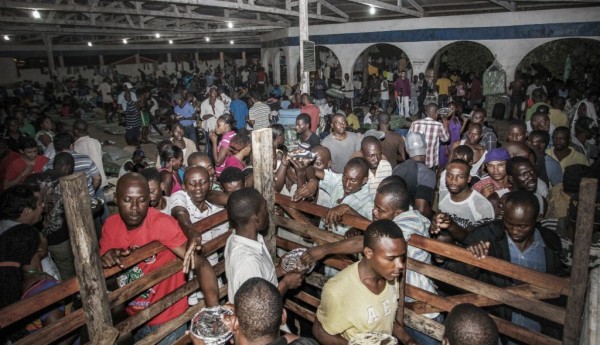By Sara Bosco
Migration is one of the biggest and most complex of today’s phenomena. Every day, all over the world, thousands of people try to cross the borders of their homelands in search of a better life in a new country.
The present international situation of globalisation is contributing to human migration, which has always existed, producing serious political, economic and social repercussions in the States that are affected by it.
One of the most serious problems to do with migration is a lack of clear and correct information. So, publishing precise and complete information about different aspects of migration is fundamental so that populations that migrate as well as host populations have elements to correct the distorted perceptions that, in the former case, contribute to their vulnerability, and in the latter, can turn into hatred and racism.
As a contribution to the treatment of this theme, we offer below a “clean up” of commonly used terms that are used to identify the subjects of the migration phenomenon and are, many times, discriminatory and incorrect.
Alien: “any individual who is not a national of the State in which he or she is present”
With the creation of the European Union the term “alien” was understood to mean “nationals of States that are not members of the European Communities.”
Stateless Person: a person who is not considered as a national by any State under the operation of its law. As such a stateless person has no rights attributable to them due to their nationality.
Asylum seeker: A person who requests recognition of their status as refugee in a third country due to a “well-founded fear of being persecuted for reasons of race, religion, nationality, membership of a particular social group or political opinion, is outside the country of his nationality and is unable or, owing to such fear, is unwilling to avail himself of the protection of that country”.
The process under which it is established that an individual who is seeking international protection is, in fact, a refugee is called “refugee status determination” and is carried out by the authorities in the arrival country in strict collaboration with the UNHCR.
Until an evaluation has been decided, the asylum seeker has the right to remain in the receiving country either without documentation or irregularly.
Refugee: The asylum seeker who, after the process of refugee status determination, has been recognised as such. According to international protection, refugees not only have the right to asylum in secure conditions, but also must enjoy the same rights as any other alien legally resident in the country.
Internally displaced person: “Persons who have been forced or obliged to flee or to leave their homes or places of habitual residence, in particular as a result of or in order to avoid the effects of armed conflict, situations of generalized violence, violations of human rights or natural or human-made disasters, and who have not crossed an internationally recognized State border.”
As opposed to refugees, internally displaced persons remain under the protection of their government, even in the case where the government itself is one of the causes for their flight. For internally displaced persons there is no equivalent legal instrument to the Convention on the Status of Refugees but they receive protection under international human rights law and international humanitarian law.
Fugitive: A general term that defines persons obliged to leave their own country as a consequence of war, political or racial persecution, or natural disaster.
Voluntary migrant: Someone who voluntarily chooses to abandon their country of residence or origin in search of work and better living conditions. This term usually covers all the cases in which the decision to migrate has been taken freely by someone due to reasons of personal convenience and without intervention of external factors that oblige them. In difference to a refugee, a voluntary migrant is not someone pursued by their own country and can return home securely.
Forced migrant: Someone who is involuntarily displaced from their place of origin or usual residence, i.e. someone motivated by pressure or the threat of external factors such as persecution, conflict, general violence or violations of human rights.
Irregular immigrant: An immigrant who doesn’t have a residency permit and who:
- Entered a country avoiding border controls;
- Originally entered a country regularly, for example on a tourist visa, but who remained after the visa expiry date;
- Did not leave the receiving country after being served with an expulsion order.
Illegal immigrant: Commonly used term to identify an irregular immigrant.
This is an incorrect term as according to article 6 of the Universal Declaration of Human Rights of 1948: “Everyone has the right to recognition everywhere as a person before the law.” An action may be illegal, not a person. An irregular administrative situation does not confer a condition of illegality on any human being.
Clandestine immigrant: Commonly used term to identify an irregular immigrant.
This is an incorrect term as it doesn’t correspond to any legal condition. The Charter of Rome has stigmatised the use of inappropriate terms such as “clandestine immigrant” as it has a negative connotation and contributes to give imprecise information and to distort the complex phenomena of migration.
Sources
- Declaration on the human rights of individuals who are not nationals of the country in which they live (1985) http://www.un.org/documents/ga/res/40/a40r144.htm
- Schengen Agreement (1985) http://eur-lex.europa.eu/legal-content/EN/TXT/HTML/?uri=CELEX:42000A0922%2801%29&from=EN
- Convention relating to the Status of Stateless Persons (1954) http://www.ohchr.org/EN/ProfessionalInterest/Pages/StatelessPersons.aspx
- Convention relating to the Status of Refugees (1951) http://www.unhcr.org/3b66c2aa10.html
- Rome Charter (2008) http://ethicaljournalisminitiative.org/assets/docs/068/223/47dfc44-3c9f7df.pdf
- The Italian online Encyclopaedia www.treccani.it
- UN High Commission for Refugees www.acnur.org
- International Organisation for Migration www.iom.int
- Diccionario de Acción Humanitaria y Cooperación al Desarrollo (The Dictionary of Humanitarian Action and Development Cooperation) www.dicc.hegoa.ehu.es
- The Red Cross https://www.icrc.org/eng/resources/documents/misc/57jpgl.htm










